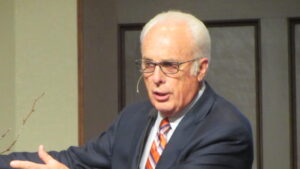Most people for most of history have known that there is a God or gods of some kind. Atheism as a widespread philosophy is, after all, a fairly recent development. And yet, while most people have known there is a God, they have not known him. They have not known who he is or what he requires, which has led to much fear and superstition. Modern atheists often point to this fear and superstition as justification for their claim that humans have now grown in our sophistication to the point where we are able to leave primitive beliefs in God behind.
We no longer need to resort to superstition to explain all that we cannot understand in the world. We no longer need to worry about knowing God and how to please him. We no longer need to tremble with fear. There is no God to know. But this explanation is wrong on two counts.
God Has Revealed Himself in Creation
First, the recent development of widespread atheism doesn’t show growth in our sophistication; it shows growth in our ability to shut our eyes to what is obviously true. Most people for most of history have believed in God or gods because there is a God who created us. And this God is not content to leave us in the dark about who he is. The one true God delights to reveal himself by showing his “eternal power and divine nature” in what he has created (Romans 1:20) so that “the heavens declare the glory of God” (Psalm 19:1). He has also “set eternity in the human heart” so that each of us longs to find meaning in life that goes beyond the daily grind we all experience (Ecclesiastes 3:11). It is because of this revelation embedded by God in creation that humans intuitively know there is a God who made us.
Secondly, atheists are wrong about fear. We will not rid ourselves of fear by denying God. Without God, there is no ultimate meaning or truth in the world—how could such an empty world produce anything but fear? No, we rid ourselves of fear not by denying God, but rather by knowing him more deeply. The problem that most people for most of history have had is that the general knowledge of God that comes from creation isn’t enough. Without more specific information about who this God is and what he has done and what he requires of us, we can’t know him. So we are left guessing about his nature (Is he one? Many? Dependable? Fickle? Good? Evil? Indifferent?) and about how to please him. It is a fearful thing to believe in a God you don’t know.
God’s Progressive Revelation Culminated in Christ
Thankfully, God has given us more revelation. He spoke through prophets and sent messages through angels so that we could know him, love him, and worship him as he deserves. And yet, even this revelation was incomplete. The messages that came through the prophets and the angels allowed people to enter into a relationship with God and to know him, but at an arm’s length. Though God dwelt with them, the holy God still caused them to tremble with fear (Hebrews 12:21). And so, God provided rituals and ceremonies, priests, sacrifices, and a temple to allow his people to approach him safely. Something more was needed—a better revelation of God. This was God’s plan all along, and Hebrews 1 tells us what, or rather, who that revelation is:
In the past God spoke to our ancestors through the prophets at many times and in various ways, but in these last days he has spoken to us by his Son, whom he appointed heir of all things, and through whom also he made the universe. The Son is the radiance of God’s glory and the exact representation of his being, sustaining all things by his powerful word. After he had provided purification for sins, he sat down at the right hand of the Majesty in heaven. So he became as much superior to the angels as the name he has inherited is superior to theirs. (Hebrews 1:1–4)
Hebrews 1:1–4 shows us that Jesus is the perfect revelation of God. God has spoken to us by his Son in a greater way than he ever spoke through the prophets. Jesus is the “radiance of God’s glory and the exact representation of his being” and the one through whom God created and sustains the universe (vv. 2–3). The Son of God is uniquely able to reveal his Father to us because the Father and Son are one. They are distinct persons, but together with the Holy Spirit, they are one God. And as the eternally begotten Son of God (John 1:18; Hebrews 1:5) he reveals God to us so that we can know God as our Father.
No Longer Fear, But Confidence
Our church has several small children who attend regularly with their parents, and most of them know me decently well, but only my three daughters have the confidence to run up to me and hug my knees or crawl into my lap. They aren’t afraid of me at all because I am their father. Because of Jesus, we no longer need to tremble in fear when we come to God. Now we may “draw near to God with a sincere heart and with the full assurance that faith brings” (Hebrews 10:22).
This is a message the angels could never have shown us, but by becoming lower than the angels, Jesus has become superior to them as a messenger from God. The Father sent the Son on a mission into the world as a human. He became one of us so God could speak to us through him. As a human, he showed us God’s justice and mercy when he died on the cross and “provided purification for sins.” He was declared “heir of all things” when he was raised from the dead (Romans 1:4). And as the heir, he has fulfilled our God-given purpose by reigning as the human Messiah over the world, showing us who we were created by God to be (Genesis 1:28; Psalm 8:6). Though, as God, his name is infinitely greater than the angels, as a human, he has inherited a name greater than theirs.
When I was younger, I was often embarrassed and annoyed by my younger siblings. Sadly, I spent a lot of my childhood ignoring them. But Jesus is not ashamed to call us his brothers and sisters. And because of his brotherly love for us, Jesus has done what no angel could do by making us holy and bringing us into glory with him (Hebrews 2:10–11).
Because of Jesus, we can know God. There is no need to assume we live in a world without meaning or truth. There is no need to fear the gods that are distant and mysterious. There are no more rituals, ceremonies, priests, sacrifices, or temple needed for us to approach the one true God safely. Because of Jesus, the curtain in the temple barring the way into the presence of God has been torn (Hebrews 10:19–20; Matthew 27:51) and we may truly know God our Father and come to him confidently and without fear.























